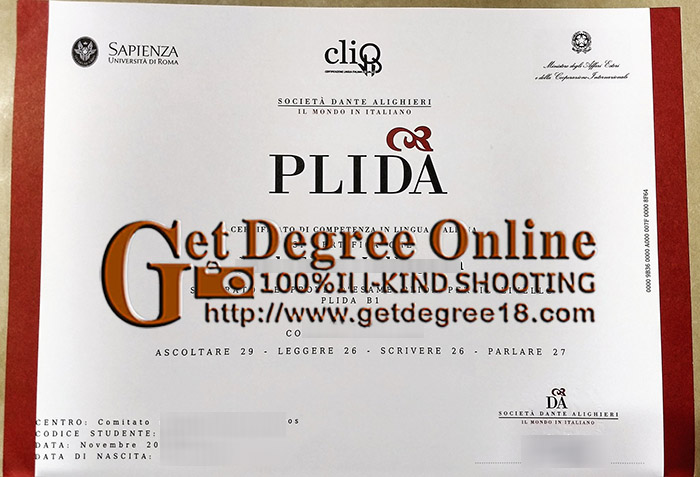
Buy PLIDA B1 Certificate, Buy Fake PLIDA Certificate, Buy Progetto Lingua Italiana Dante Alighieri Certificate, Buy Italy Fake Diploma, PLIDA, or Progetto Lingua Italiana Dante Alighieri (Dante Alighieri Society Diplomas), are language diplomas issued by Dante Alighieri Society certifying the holder’s proficiency in Italian language as a foreign language. The diplomas could only be obtained after passing a standardised language test. The Rome Branch of the Dante Alighieri Society is the official centre of examination for the issuing of PLIDA Certification.
The Dante Alighieri Society is the organiser of PLIDA tests, with the academic approval from the Sapienza University of Rome. The Certification test is designed on the principles of the communicative approach, based on real-life tasks so as to test the ability in four areas: listening, reading, writing and speaking. The examination lasts for a minimum of 100 minutes to a maximum of 190 minutes, depending on the level.
There are tests of six levels, A1 to C2, set according to the levels in the Common European Framework of Reference for Languages.
- A1: the ability to use familiar everyday expressions aimed at the satisfaction of needs of a concrete type and to ask and answer questions about personal details. At this level of competence, interaction with Italian speakers can take place provided the other person is prepared to help.
- A2: the ability to communicate in simple and routine tasks requiring a simple and direct exchange of information on areas of most immediate relevance, such as personal and family description, shopping, local geography and employment.
- B1: the ability to understand written and spoken texts on familiar matters. At this level, one is able to engage effectively in a conversation as a tourist, to express opinions and to give simple explanations.
- B2: the competence in the language which is necessary in a traditional scholastic context (to register with school or universities), to pursue post-graduate learning (such as professional and training courses), as well as to prepare for work activities that involve interaction with the public. At this level, one can interact with Italian speakers fluently and spontaneously and use the language for work related activities in one’s own field.
- C1: a strong confidence with the Italian language and culture, such that it can be used in all working environments (professional, commercial, industrial and administrative). One can understand and produce a wide range of demanding, longer texts and recognise implicit meanings in complex writings such as literary works.
- C2: a high linguistic competence comparable to that possessed by an Italian cultured speaker and applicable in any and all professional settings. It is the level required to teach Italian as a foreign language and to qualify for professional assignments of a high degree.


